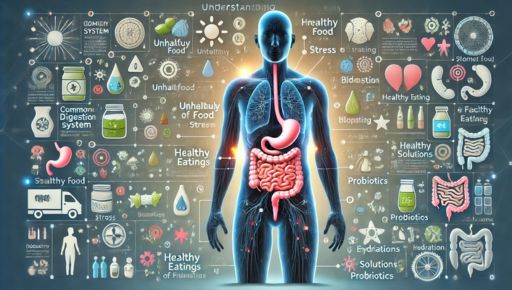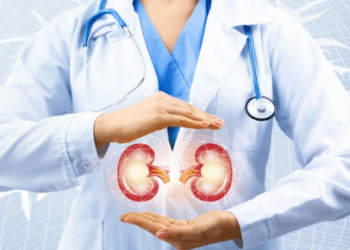
Digestion problems are a common issue that many people face at some point in their lives. Whether it’s bloating, constipation, diarrhea, or heartburn, these digestive disturbances can cause discomfort and disrupt daily activities. If you are experiencing digestion problems, it’s important to understand the underlying causes, identify the symptoms, and explore effective solutions to restore balance to your digestive system.
In this article, we will dive into the different types of digestion problems, their causes, symptoms, and provide practical solutions to help improve your digestive health.
What Are Digestion Problems?
Digestion problems refer to any condition or disorder that affects the digestive system, leading to difficulty in processing food and absorbing nutrients properly. The digestive system includes the mouth, esophagus, stomach, small intestine, large intestine, and other organs that work together to break down food and absorb nutrients. When there’s a disruption in this process, it can lead to various discomforting symptoms such as bloating, gas, stomach cramps, and changes in bowel movements.
Common digestion problems include:
- Irritable Bowel Syndrome (IBS)
- Gastroesophageal Reflux Disease (GERD)
- Acid Reflux
- Constipation
- Diarrhea
- Indigestion
- Food Intolerances
- Gastroparesis
Common Causes of Digestion Problems
Digestion problems can arise from various factors, including lifestyle habits, dietary choices, and medical conditions. Here are some of the most common causes:
1. Poor Diet
A diet high in processed foods, unhealthy fats, and sugar can disrupt digestion. Fiber plays a crucial role in maintaining digestive health, so a lack of fiber-rich foods like fruits, vegetables, and whole grains can lead to constipation and other digestion problems.
2. Stress
Chronic stress can have a significant impact on the digestive system. It can trigger conditions like irritable bowel syndrome (IBS), acid reflux, or even exacerbate existing digestive problems. Stress can cause the body to produce excessive stomach acid or slow down the digestive process.
3. Food Intolerances and Allergies
Certain foods, like dairy, gluten, or certain types of carbohydrates, can cause discomfort in individuals who have intolerances or allergies. When the body struggles to digest certain foods, symptoms such as bloating, gas, diarrhea, or abdominal pain can occur.
4. Lack of Physical Activity
A sedentary lifestyle can slow down digestion and lead to constipation. Regular physical activity helps stimulate the digestive system and promotes healthy bowel movements.
5. Medications
Some medications, such as antibiotics, painkillers, and antidepressants, can disrupt the balance of bacteria in the gut or cause side effects that interfere with digestion. If you suspect that your medications are contributing to digestion problems, it’s important to consult your healthcare provider.
6. Underlying Health Conditions
Certain health conditions, such as inflammatory bowel disease (IBD), celiac disease, and gastrointestinal infections, can cause chronic digestive issues. It’s important to seek medical attention if you experience persistent digestive problems.
Common Symptoms of Digestion Problems
The symptoms of digestion problems can vary depending on the condition, but some common signs include:
- Bloating – Feeling full or swollen in the abdomen after eating.
- Gas – Excessive burping or flatulence.
- Stomach cramps – Discomfort or pain in the abdominal area.
- Heartburn – A burning sensation in the chest or throat, often after eating.
- Diarrhea – Frequent, loose stools that can be accompanied by urgency.
- Constipation – Infrequent or difficult bowel movements.
- Indigestion – A feeling of fullness or discomfort in the stomach, often after eating.
If you experience any of these symptoms regularly, it’s important to evaluate your diet and lifestyle, as they may be contributing to your digestion problems.
Solutions to Improve Digestion
Fortunately, there are several strategies you can adopt to manage and alleviate digestion problems. Below are some effective solutions:
1. Eat a Balanced, Fiber-Rich Diet
A diet rich in fiber helps regulate bowel movements and supports overall digestive health. Include a variety of high-fiber foods such as fruits, vegetables, whole grains, and legumes in your diet. Fiber promotes healthy digestion by aiding in the movement of food through the digestive tract and preventing constipation.
2. Stay Hydrated
Drinking plenty of water throughout the day is essential for digestion. Water helps break down food so that nutrients can be absorbed and prevents constipation by softening stools. Aim for at least 8 cups of water per day, or more if you are physically active.
3. Practice Portion Control
Overeating can put stress on your digestive system and lead to symptoms like bloating, indigestion, and acid reflux. Try eating smaller, more frequent meals throughout the day to give your digestive system a break and prevent overeating.
4. Exercise Regularly
Physical activity helps stimulate digestion and promotes regular bowel movements. Aim for at least 30 minutes of moderate exercise most days of the week. Activities like walking, jogging, yoga, and swimming can all aid in digestion.
5. Manage Stress
Stress management techniques, such as meditation, deep breathing exercises, yoga, and mindfulness, can help alleviate digestion problems caused or worsened by stress. Taking time to relax and unwind each day can have a significant impact on your digestive health.
6. Identify and Avoid Trigger Foods
If you suspect that certain foods are contributing to your digestion problems, try keeping a food diary to track what you eat and how it affects your digestive system. Once you identify any trigger foods, eliminate or limit them from your diet. Common triggers include dairy, gluten, fatty foods, and spicy foods.
7. Consider Probiotics
Probiotics are beneficial bacteria that help maintain a healthy balance of gut flora. Taking probiotic supplements or consuming probiotic-rich foods like yogurt, kefir, sauerkraut, and kimchi can promote digestive health and help alleviate problems like bloating, gas, and diarrhea.
8. Consult a Healthcare Professional
If you have persistent or severe digestion problems, it’s important to consult a healthcare professional for proper diagnosis and treatment. A doctor can help identify any underlying medical conditions, such as irritable bowel syndrome (IBS), acid reflux, or celiac disease, and recommend appropriate treatment options.
Conclusion
Digestion problems can range from mild discomfort to chronic, debilitating conditions. By understanding the causes, recognizing the symptoms, and adopting healthy lifestyle changes, you can manage and alleviate many digestive issues. A balanced diet, regular exercise, stress management, and proper hydration are key to maintaining optimal digestive health. If necessary, consult a healthcare professional for further guidance and treatment options.
Don’t let digestion problems control your life. Take proactive steps to improve your digestive health today for a more comfortable and energetic tomorrow.


















